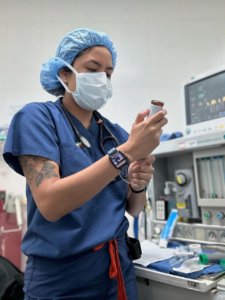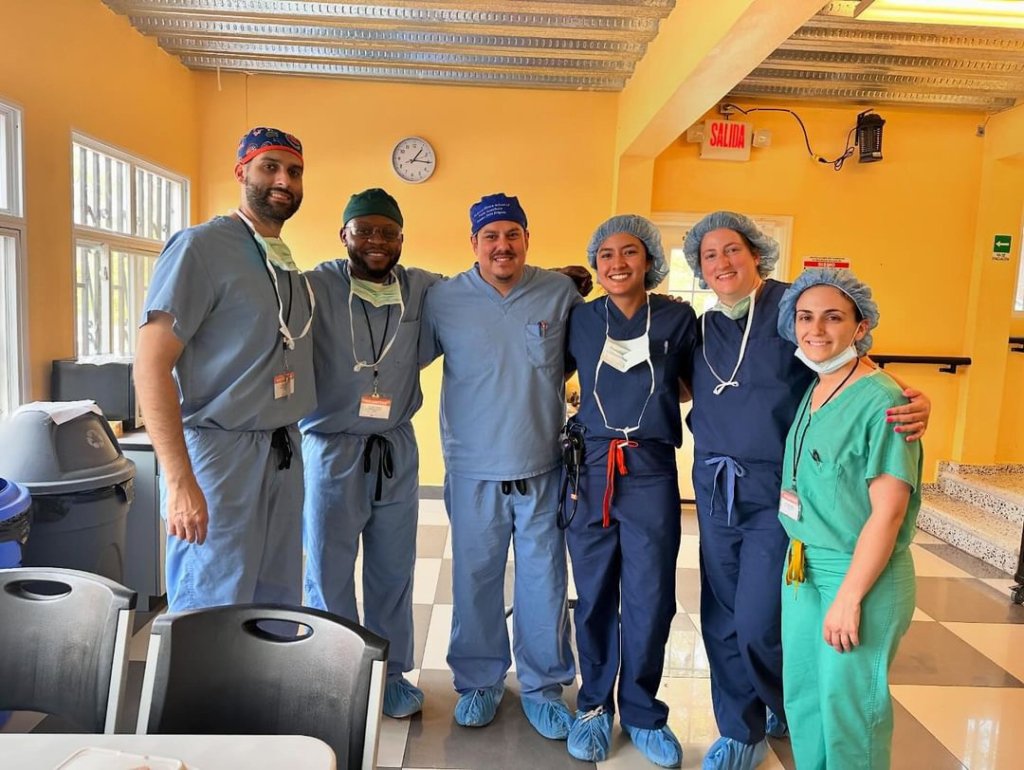June 10, 2024
By Joanne Marquez, AANA PR and Communications
In the heart of Honduras, Resident Registered Nurse Anesthetist (RRNA) Karina V. Rivadeneira, BSN, RN, embarked on a transformative journey that surpassed the boundaries of her nursing education and experience.
After learning about the One World Surgery – Honduras brigade through Keiser University, Rivadeneira jumped at the opportunity to participate, thanks to a sponsorship by Envision Physician Services. She cited her late mother as an inspiration, stating that she couldn’t pass up the opportunity to help the people at the Nuestros Pequeños Hermanos compound.
“I remember [my mother] being the scared and confused patient who could not properly communicate with her caregivers since her primary language was Spanish. These thoughts always flood my mind whenever I am in a clinical setting and my Hispanic patients’ eyes light up as I speak to them in their native language,” Rivadeneira noted.
Arriving at the compound, she joined a team of physician anesthesiologists and Certified Registered Nurse Anesthetists (CRNAs), also known as nurse anesthesiologists or nurse anesthetists, along with various other physicians and support staff. Working with them, she recounted, felt like being in a well-oiled machine. She and her team dove head-first into the depths of service and compassion, fully embracing the opportunity to make a tangible difference in the time they have.

Karina Rivadeneira
In Honduras, Rivadeneira worked with the team that provided more than 50 general and colorectal surgeries. Beyond this, she also saw countless patients at the adult and children’s clinics. With only a week to work, she had a full schedule, often being pulled from one end of the compound to another.
“We would take turns running rooms, working as nurses, and even translators; our efficiency lay in filling gaps wherever needed. There were multiple days where I was doing a regional block for a pre–operative patient, then being pulled to hike to the children’s clinic to translate for the pediatric emergency medicine physician. It felt like we all did whatever we could to ensure there were minimal delays for these patients who had often been needing surgical or medical care for sometimes even years,” she said.
To Rivadeneira, every moment of her mission trip resonated with a profound sense of humility, illuminating the power of empathy and the universal language of care. She found strength and inspiration in the Honduran people living in the compound, speaking reverently about the tenacity and grit every patient of hers displayed.
She highlighted a specific patient encounter, where she had the uneasy task of translating a possible cancer diagnosis, along with news about possible delays in her procedure. With years of experience as an ICU nurse at major hospitals, Rivadeneira was no stranger to the onslaught of emotions that come with bad news, but when her patient erupted in not anger, but joy and gratitude, she was taken aback.
“Despite waiting for multiple hours for her turn to roll back to the operating room, she never complained about the wait and maintained an attitude of nothing but kindness and constantly blessed everyone who checked up on her,” said Rivadeneira.
She continued, “I assured her that the surgical team would take great care of her and that this was an important step in the process. During that moment, she reached out to hold my hand and as I held onto hers, she became teary-eyed. I hugged her and she eventually began crying and thanking me constantly.”
For Rivadeneira, Honduras was more than just a mission trip—it was a canvas upon which her passion for healing and patient care found its purpose, which ignited a flame that will forever illuminate her path as a future CRNA. She will graduate from Keiser University with her Doctor of Nursing Practice degree later this summer and plans to serve as a CRNA in more rural areas, citing her experiences in Honduras as an important lesson for her future.

Left to right: Aleem Juma, RRNA; Kevin Djatcha, RRNA; Carlos (Honduran Anesthesia Tech); Karina Rivadeneira, BSN, RN, RRNA; Adamary Valdes-Wali, RRNA; and Amanda Sciarillo, BSN, RN, CCRNA
